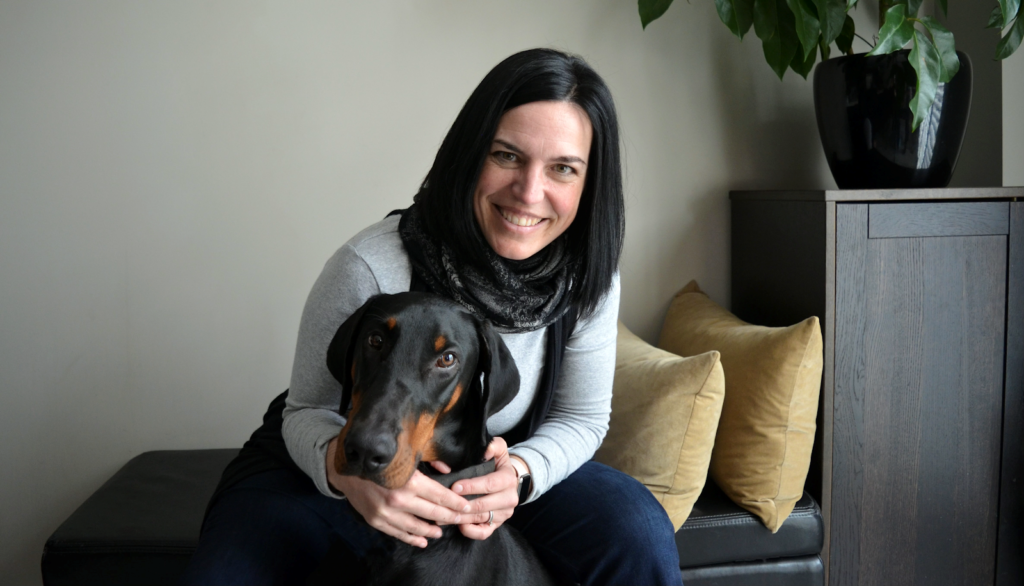

Features
Bullying
Health & Safety
Workplace Violence
A safe haven: Employers can offer security, support to staff who are victims of stalking
February 6, 2024
By
Todd Humber
 Amy Davies with her Doberman Riker. Photo: Submitted
Amy Davies with her Doberman Riker. Photo: Submitted Amy Davies had a prime parking spot in front of her office. But it wasn’t because she was a senior member of the management team, nor was it a perk offered for great performance. Instead, it was for a terrifying reason.
“I was the victim of a stalker,” she said. “I was being monitored and harassed in every imaginable way for months.”
Normally, Davies — along with most of the employees — parked behind the building near a wooded area. But when she told her employer what was happening, it offered support and made a few small changes in the workplace that made a huge difference to her security and peace of mind.
“That parking spot was one of the things that helped me the most,” she said. “I didn’t park there forever, but during the escalation period it really made me feel safe. At this time of year, when you get to the office it’s dark and when you leave it’s dark. It was a well-lit area.”
Davies, who moved on from that job and is now the CEO of First30 — a company specializing in onboarding and outplacement — said there are several steps employers can take to help staff who are the victims of stalkers.
A prevalent issue
One of the first things is to understand just how prevalent the problem is: Nearly one in three women, and one in six men, have been the victim of a stalker at some point, according to data out of the United States.
According to Statistics Canada, more than four in 10 women (44 per cent) who have been in an intimate partner relationship reported experiencing some sort of intimate partner violence.
“The numbers are scary. Almost three women are murdered every day by an intimate or an ex-intimate partner in the U.S.,” said Davies. On this side of the border, a woman is murdered every six days by an intimate or ex-intimate partner, and the rate is even higher among the BIPOC and Indigenous communities, she said.
Her story
Davies was stalked by an ex-intimate partner. At one point, he gained access to her phone and installed tracking software on it so he could watch her every movement.
“I was a trusting person. My security on my phone was like 0-0-0-0,” she said. “He put Find a Friend on my phone and hid it in another application.”
On top of that, he was inundating her with messages — emails and texts that were coming in around the clock.
“After three months, I had 600 pages of texts and emails that I had printed out to take to the police,” said Davies. There was evidence that he hired a private investigator to track her and was taking photographs outside of her workplace.
“It was beyond terrifying, and he was tracking me in ways that I only discovered later,” she said. “For example, he downloaded all of my emails and all my texts to my friends for months and months.”
Her employer’s response
Davies is blunt about how her employer reacted. “They saved me.”
“The best thing an employer can do is not only believe someone, but to protect them by using what resources they have,” she said. “Unfortunately, with the legal system the way it is, we need to have resources in order to be able to protect ourselves.”
When they gave her the parking spot out front, they also gave a picture of her stalker to the security guards.
“They didn’t need to tell security why, but they said ‘Do not let this person into the building,’” she said. “Security was always good, but they were even more vigilant.”
Her bosses also told her she could take time off if necessary, something she took advantage of — but just for one week.
“I had to take that week off, because there was an arrest warrant out for my perpetrator, but he hadn’t been arrested yet,” said Davies. “I had to actually go to a secure location and take my children out of school until he was incarcerated.”
Another relief was flexibility. Her employer said she could come and go from the office as needed during this time.
“They said to me, ‘Do not stress if you must get up and walk out of the office. You do not have to explain yourself to anyone,’” she said, adding that the flexibility can help people avoid routines that can make it easier for the stalker to find them.
The employer also kept what was happening in strict confidence, which was hugely important to her.
“I was incredibly ashamed because my stalker was someone I invited into my life,” she said. “This dramatic situation somehow felt like an epic fail on my part.”
In her case, several of her office colleagues were contacted by him — but everyone kept it confidential and only discussed the matter with her and the HR department. “Victims have the right to privacy,” she said.
Advice for people in her shoes
For people who are going through a stalker situation, Davies’ advice is to listen to yourself and trust your instincts.
“Do you feel afraid? If you feel afraid, there’s probably a good reason why you do,” she said. “Often our gut will tell us, ‘Oh, I feel like someone is watching me right now.’ It’s a strange thing, but our gut is very powerful, and it’s put there for a reason.”
The other thing to remember is that you said “no.”
“I love that expression ‘No is a complete sentence.’ If you’ve asked them not to contact you, and you haven’t engaged with them, and they continue — that is stalking behaviour,” she said.
Being the victim of a stalker can be traumatizing, she said, and trauma can change your brain and the way you live your life.
“It’s always at the back of your mind,” she said. “I have a Doberman now. He’s an amazing dog, and his name is Riker. My ‘Number One,’ if you’re a Star Trek fan. I have a security system. I don’t have a routine.”
The last word
Her parting bit of advice for employers is remember that they don’t need to be the hero in the story.
“You’re their employer. You don’t know everything, so don’t pretend that you do,” she said. “Direct them to the places where they can get that professional advice and support such as an EAP or a lawyer.”
“It’s not your problem to solve. It’s your problem to support,” she said.
Additional resources
Print this page
